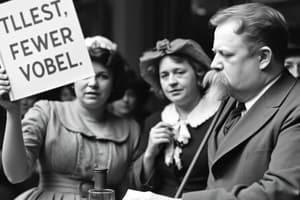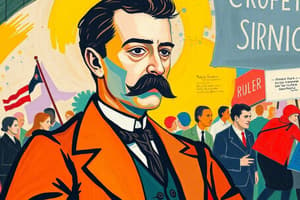Podcast
Questions and Answers
What was the main goal of Theodore Roosevelt's Square Deal?
What was the main goal of Theodore Roosevelt's Square Deal?
- To encourage the growth of big business
- To distinguish between good and bad corporations and regulate the economy (correct)
- To only focus on environmental conservation
- To reduce government intervention in the economy
What was the significance of the Clayton Act of 1914?
What was the significance of the Clayton Act of 1914?
- It imposed higher tariffs on imported goods
- It exempted unions from anti-trust laws (correct)
- It established the Federal Reserve System
- It created the National League and American League in baseball
What was the main idea behind Woodrow Wilson's New Freedom program?
What was the main idea behind Woodrow Wilson's New Freedom program?
- To emphasis on loans and economic investment abroad
- To promote stronger anti-trust laws and support small businesses (correct)
- To focus on environmental conservation
- To reduce government regulation of business
What was the result of William Howard Taft's prosecution of Standard Oil in 1911?
What was the result of William Howard Taft's prosecution of Standard Oil in 1911?
What was the main goal of Woodrow Wilson's Dollar Diplomacy?
What was the main goal of Woodrow Wilson's Dollar Diplomacy?
What was the significance of the Roosevelt Corollary to the Monroe Doctrine?
What was the significance of the Roosevelt Corollary to the Monroe Doctrine?
What was the primary focus of Franklin Roosevelt's leadership style during the 100 Days?
What was the primary focus of Franklin Roosevelt's leadership style during the 100 Days?
What was the outcome of the Emergency Banking Act of 1933?
What was the outcome of the Emergency Banking Act of 1933?
What was the primary goal of Franklin Roosevelt's New Deal?
What was the primary goal of Franklin Roosevelt's New Deal?
What was the significance of the 100 Days of Franklin Roosevelt's presidency?
What was the significance of the 100 Days of Franklin Roosevelt's presidency?
What was the role of the Federal Reserve in the Emergency Banking Act of 1933?
What was the role of the Federal Reserve in the Emergency Banking Act of 1933?
What was one of the reasons why farmers supported the use of silver as a monetary standard?
What was one of the reasons why farmers supported the use of silver as a monetary standard?
What was the main criticism of the 'spoils system'?
What was the main criticism of the 'spoils system'?
What was one of the main arguments made by industrialists in favour of tariffs?
What was one of the main arguments made by industrialists in favour of tariffs?
What was the main goal of party bosses in political machines?
What was the main goal of party bosses in political machines?
What was the significance of Tammany Hall?
What was the significance of Tammany Hall?
What was one of the benefits of an inflationary policy for those who borrowed money?
What was one of the benefits of an inflationary policy for those who borrowed money?
What was the significance of the Banking Act of 1935?
What was the significance of the Banking Act of 1935?
What was the primary goal of the New Deal's Agricultural Adjustment Administration (AAA)?
What was the primary goal of the New Deal's Agricultural Adjustment Administration (AAA)?
What was the main achievement of the Federal Emergency Relief Administration (FERA)?
What was the main achievement of the Federal Emergency Relief Administration (FERA)?
What was the primary goal of the Civil Conservation Corps (CCC)?
What was the primary goal of the Civil Conservation Corps (CCC)?
What was the significance of the Securities and Exchange Commission (SEC) established in 1934?
What was the significance of the Securities and Exchange Commission (SEC) established in 1934?
What was the primary goal of the National Recovery Administration (NRA)?
What was the primary goal of the National Recovery Administration (NRA)?
What was the significance of the Tennessee Valley Authority (TVA) established in 1934?
What was the significance of the Tennessee Valley Authority (TVA) established in 1934?
What was the primary goal of the Public Works Administration (PWA)?
What was the primary goal of the Public Works Administration (PWA)?
What was the significance of the Federal Communication Commission (FCC) established in 1934?
What was the significance of the Federal Communication Commission (FCC) established in 1934?
What was the primary goal of the Emergency Railroad Transportation Act (ERTA) established in 1934?
What was the primary goal of the Emergency Railroad Transportation Act (ERTA) established in 1934?
Flashcards are hidden until you start studying
Study Notes
Rise of National Governments and Corporations
- Late 19th century to early 20th century: National governments rise, and corporations become international
- Example: British East India Company was an international corporation
- Even sports were affected, with the formation of the National League and American League in baseball
Theodore Roosevelt (TR)
- 1901: Becomes President after William McKinley's assassination
- Square Deal: aimed to distinguish between good and bad corporations
- Believed federal government should regulate economy directly and break up power of wealthy corporations
- Used Sherman Act to prosecute bad trusts (e.g., Northern Securities Company)
- Conservationist: wanted to preserve environment from economic exploitation
- Appointed Gifford Pinchot as head of forest service, setting aside millions of acres for national parks
William Howard Taft
- 1908: TR chooses Taft as successor
- Trust-buster, but not as aggressively as TR
- Ordered prosecution that broke up Standard Oil in 1911
- Supported 16th Amendment (income tax) and 18th Amendment (Prohibition)
Election of 1912
- Candidates: Taft, TR (Bull Moose Party), Eugene Debs (Socialist Party), Woodrow Wilson (Democrat)
- TR's platform: New Nationalism, including heavy taxes on personal and corporate fortunes, federal regulation of industries
- Wilson's platform: New Freedom, with stronger anti-trust laws and policies to encourage small businesses
Woodrow Wilson's Presidency
- Election of 1912: Won with 42% of the popular vote
- New Freedom program:
- Underwood Tariff: reduced import duties
- 16th Amendment: income tax on the richest 5% of Americans
- Clayton Act of 1914: exempted unions from anti-trust laws, making it easier to strike
- Keating-Owen Act: outlawed child labor in manufacturing
- Adamson Act: mandated 8-hour workday for railroad workers
- Federal Reserve System (1913): gave government more control over banks in response to Panic of 1907
Progressivism and International Relations
- Roosevelt Corollary to the Monroe Doctrine: US would exercise "international police power" in the Western Hemisphere
- Wilson's Dollar Diplomacy: emphasized loans and economic investment to spread American influence
- Interventions in Latin America:
- Panama Canal construction
- Dominican Republic: seized customs house to ensure debt repayment to American investors
- Honduras and Costa Rica: encouraged investment by United Fruit Company, creating "Banana Republics"
Conclusion
- Roosevelt, Taft, and Wilson expanded federal government power both domestically and internationally
- Recognized need for government to deal with big business and ensure American freedom in the industrial era
- Foreign policy focused on ensuring a safe environment for American business abroad
Rise of National Governments and Corporations
- Late 19th century to early 20th century saw the rise of national governments and international corporations, exemplified by the British East India Company
- Even sports were affected, with the formation of the National League and American League in baseball
Theodore Roosevelt (TR)
- Became President in 1901 after William McKinley's assassination
- Implemented the Square Deal, aimed at distinguishing between good and bad corporations
- Believed in direct federal regulation of the economy and breaking up the power of wealthy corporations
- Used the Sherman Act to prosecute bad trusts, such as the Northern Securities Company
- Was a conservationist, preserving millions of acres for national parks, and appointed Gifford Pinchot as head of the forest service
William Howard Taft
- Chosen by TR as his successor in 1908
- Was a trust-buster, but not as aggressively as TR
- Ordered the prosecution that broke up Standard Oil in 1911
- Supported the 16th Amendment (income tax) and 18th Amendment (Prohibition)
Election of 1912
- Candidates included Taft, TR (Bull Moose Party), Eugene Debs (Socialist Party), and Woodrow Wilson (Democrat)
- TR's platform included New Nationalism, with heavy taxes on personal and corporate fortunes, and federal regulation of industries
- Wilson's platform included New Freedom, with stronger anti-trust laws and policies to encourage small businesses
Woodrow Wilson's Presidency
- Won the election of 1912 with 42% of the popular vote
- Implemented the New Freedom program, including:
- The Underwood Tariff, which reduced import duties
- The 16th Amendment, which introduced income tax on the richest 5% of Americans
- The Clayton Act of 1914, which exempted unions from anti-trust laws, making it easier to strike
- The Keating-Owen Act, which outlawed child labor in manufacturing
- The Adamson Act, which mandated an 8-hour workday for railroad workers
- Established the Federal Reserve System in 1913, giving the government more control over banks in response to the Panic of 1907
Progressivism and International Relations
- Roosevelt Corollary to the Monroe Doctrine: US would exercise "international police power" in the Western Hemisphere
- Wilson's Dollar Diplomacy emphasized loans and economic investment to spread American influence
- Interventions in Latin America included:
- Panama Canal construction
- Dominican Republic: seizing the customs house to ensure debt repayment to American investors
- Honduras and Costa Rica: encouraging investment by United Fruit Company, creating "Banana Republics"
Conclusion
- Roosevelt, Taft, and Wilson expanded federal government power both domestically and internationally
- Recognized the need for government to deal with big business and ensure American freedom in the industrial era
- Foreign policy focused on ensuring a safe environment for American business abroad
Studying That Suits You
Use AI to generate personalized quizzes and flashcards to suit your learning preferences.




